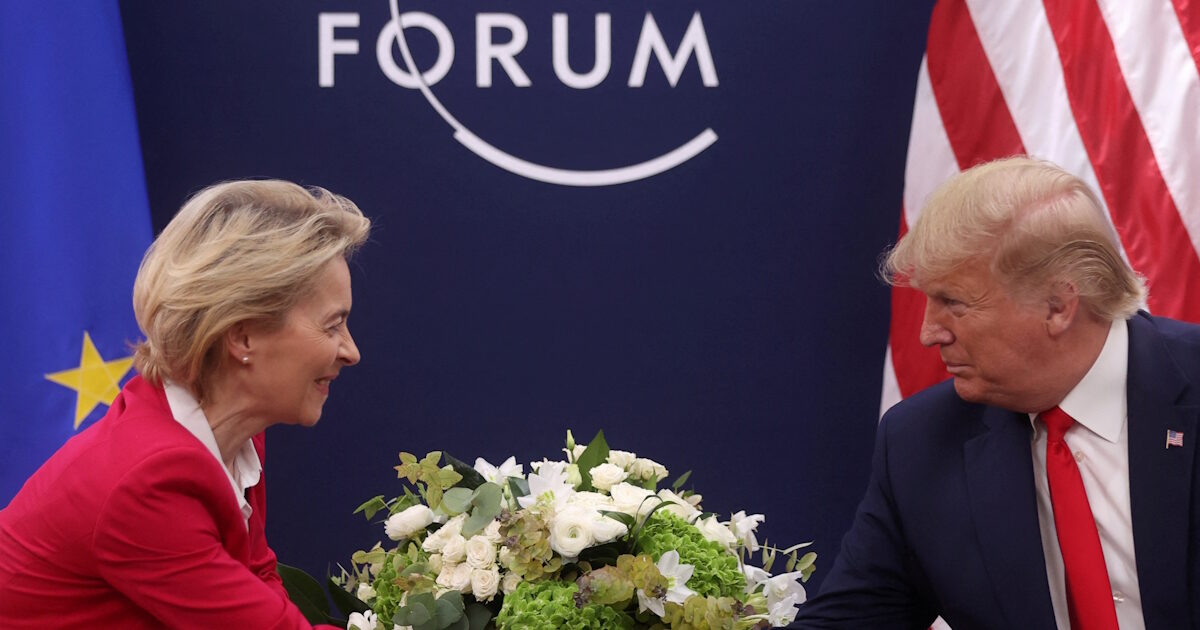At a critical point is her relationships EU with the USA Trade, as US President Donald Trump continues with the protective duties agenda and the EU is shaping a strategic proposal to keep the balance.
Specifically, the EU is planning a major proposal to the US President with the aim of degrading commercial tensions and avoiding a trade war that could seriously affect the economies of both sides, according to a report by Ertnews.
Imports of 50 billion euros from the US
European Commissioner Maros Sefsovic has announced that the EU is ready to increase imports of US products by 50 billion euros, including liquefied natural gas (LNG), soybeans and other agricultural products. The aim is to reduce the commercial deficit and prevent tariff duties, which reach up to 25% in European products such as cars, steel and aluminum
One quick way to eliminate duties, Trump said in April, would be to buy the EU liqueured gas worth $ 350 billion and close the US trade deficit. The EU cannot absorb. In 2024, US exports of liquefied natural gas to the EU were about $ 13 billion and covered half of it, according to Columbia University.
According to the FTs, Mr Sefsovic said that the main argument raised by US trade representative Jameson Grier and Commerce Minister Howard Lutnik was to take into account US exports to the EU, which would make the EU, which would make it a total of 50 euros.
This could be quickly covered by agreements on the purchase of more American gas products and agricultural products. “If what we see as a problem in the deficit is 50 billion euros, I think we can really .. solve this problem very quickly through the market for liquefied natural gas, through certain agricultural products such as soybeans, or in other areas,” Sefcovic said in an interview with FT. Although some European countries are concerned about the impact on their own agricultural producers, the EU is considering impact absorption mechanisms.
This increase in imports does not imply mandatory abolition of existing European regulations, but requires careful balance of environmental and agricultural policies.
Mutual Remove duties in Industrial Products
The EU is also offered to negotiate the complete elimination of duties in all industrial goods, excluding agricultural products. This is an ambitious proposal that could significantly enhance the transatlantic trade.
This idea is aimed at:
- Enhancing the competitiveness of industries on both sides of the Atlantic.
- Preventing the transfer of production units outside Europe or US due to duties.
- The simplification of commerce, with a possible creation of a more stable regulatory framework.
- However, such reforms require the consent of all Member States and the approval of the European Parliament, which complicates the negotiations.
Diplomatic strategy: carrot and whip
The EU approach is not only based on concessions. On the contrary, it applies a balanced diplomatic strategy that includes:
- Incentives: such as increased imports and the proposal to remove duties.
- Revolutionary Preparation: If the US insists on imposing duties on basic European products such as cars or drinks, the EU is ready to pay up to € 26 billion.
This balanced approach seeks to encourage cooperation while maintaining the union’s negotiating power.
Common front to deal with Chinese overproduction
The EU is also trying to reinstate dialogue to a more strategic level, proposing joint US initiatives for:
- The treatment of Chinese overproduction of steel and aluminum, which leads to price falls and unfair competition.
- Strengthening the International Trade Surveillance Mechanism through the World Trade Organization.
- Creating such a transatlantic front enhances the likelihood of cooperation instead of collision.
Political and social reactions within the EU
The EU’s offer to Trump is not universally accepted within the Union. Some Member States, such as France, express serious reservations, especially in matters:
- Environmental Compliance: France insists that EU trade partners must comply with the Paris Agreement on the climate.
- Rural Production: Rural Associations in Spain, Poland and Italy are afraid of pressure on local producers from imports of cheaper US products.
The EU should adjust its offer so as not to risk its social and political cohesion.
Deadlines and critical stations
The pressure of time is great. The US has announced that new duties may come into force in July. Until then, the EU must present a legally binding proposal, ensure internal cohesion and acceptance of the agreement, prepare for the possibility of failure to fail.
The success or failure of these negotiations can determine the course of transatlantic relationships for the coming years.
